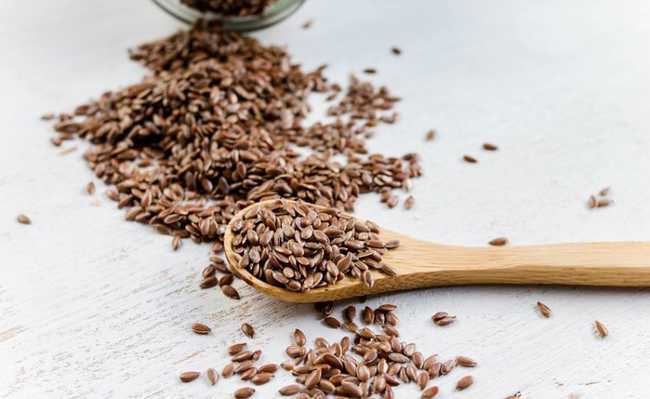Flaxseed: 11 proven benefits
Benefits of consuming flaxseed include lowering cholesterol, improving blood pressure, and decreasing cancer risk.

Emperor Charlemagne already knew the benefits of flaxseed, having ordered his subjects to eat flaxseeds to take care of their health. Currently, flaxseed has gained a reputation as a superfood and there are studies that confirm its benefits. Consuming flaxseeds frequently contributes to lowering cholesterol, improving blood pressure and decreasing the risk of cancer.
Flaxseed Benefits
1. Nutritious
The cultivation of flaxseeds is one of the oldest in the world. There are two types of flaxseeds, brown and golden, which are equally nutritious.
Just a tablespoon of flaxseed (about 7 grams) provides a good amount of protein, fiber and omega 3 fatty acids, as well as being a rich source of some vitamins and minerals. One tablespoon of ground flaxseed contains:
- Calories: 37
- Protein: 1.3 grams
- Carbohydrates: 2 grams
- Fiber: 1.9 grams
- Total fat: 3 grams
- Saturated fat: 0.3 grams
- Monounsaturated fat: 0.5 grams
- Polyunsaturated fat: 2.0 grams
- Omega 3 fatty acids: 1,597 mg
- Vitamin B1: 8% of the Recommended Daily Intake (RDI)
- Vitamin B6: 2% of the RDI
- Folate: 2% of the IDR
- Calcium: 2% of the IDR
- Iron: 2% of the IDR
- Magnesium: 7% of the IDR
- Phosphorus: 4% of the IDR
- Potassium: 2% of the IDR
Flaxseed's health benefits are mainly attributed to its omega-3, lignan and fiber content.
2. Rich in Omega 3
If you are a vegetarian or do not eat fish, flaxseed may be your best source of omega-3 fats.
They are a rich source of alpha-linolenic acid (ALA), an omega-3 fatty acid. ALA is one of the two essential fatty acids that must be obtained from food intake because the body does not produce it.
Animal studies (1, 2, 3) show that the ALA present in flaxseeds prevented cholesterol from being deposited in the blood vessels of the heart, reduced inflammation in the arteries and reduced tumor growth.
A Costa Rica study of 3,638 people found that those who ate the most ALA had a lower risk of heart attack than those who ate the least ALA. In addition, a large review of 27 studies involving more than 250,000 people found that ALA was associated with a 14% lower risk of heart disease.
Numerous studies (5, 6, 7) have also linked ALA to a lower risk of stroke. A recent review of observational data also concluded that ALA has heart health benefits comparable to eicosapentaenoic acid (EPA) and docosahexaenoic acid (DHA), two of the best-known omega-3 fats.
3. Source of lignans, which can reduce cancer risk
Lignans are plant compounds that have antioxidant and estrogenic properties, which can help reduce the risk of cancer and improve health (see study about it here). Interestingly, flaxseeds contain up to 800 times more lignans than other plant foods (see study about it here).
Observational studies have shown that those who eat flaxseeds have a lower risk of breast cancer, particularly postmenopausal women. A Canadian study involving more than 6,000 women also showed that those who ate flaxseeds were 18% less likely to develop breast cancer.
However, men can also enjoy the benefits of flaxseed. In a small study including 15 men, those who received 30 grams of flaxseed a day, following a low-fat diet, showed reduced levels of a prostate cancer marker, suggesting a lower risk of prostate cancer.
Flaxseed also appears to have the potential to prevent colon and skin cancer, according to laboratory and animal studies. However, more research is needed to confirm this.
4. Rich in dietary fiber
Just one tablespoon of flaxseed contains 3 grams of fiber, which corresponds to 8% to 12% of the recommended daily allowance for men and women, respectively, according to the study.
In addition, flaxseeds contribute to the diet with soluble (which represent 20 to 40% of the flaxseed composition) and insoluble (60 to 80% of the flaxseed) fiber. This fiber duo is fermented by bacteria in the large intestine, increasing stool and resulting in more regular bowel movements.
On the one hand, soluble fiber increases the consistency of the intestinal contents and slows down the digestion rate. This helps regulate blood sugar and lower cholesterol, according to a study.
Insoluble fiber allows more water to bind to the stool, increases its mass and results in softer stool. This is useful for preventing constipation and for those who have irritable bowel syndrome or diverticular disease (see study about it here).
5. Helps improve cholesterol

Image by Marco Verch, available on Flickr under Creative Commons 2.0 license
Another health benefit of flaxseeds is their ability to lower cholesterol levels.
In a study of people with high cholesterol, consuming 3 tablespoons (30 grams) of flaxseed powder daily for three months reduced total cholesterol by 17% and LDL (the "bad") cholesterol by nearly 20%. Another study of people with diabetes found that taking a scoop (10 grams) of flaxseed powder daily for a month resulted in a 12% increase in HDL cholesterol, the "good cholesterol."
In postmenopausal women, daily consumption of 30 grams of flaxseed reduced total cholesterol and LDL cholesterol by approximately 7% to 10%, respectively.
These effects appear to be due to the fiber in flaxseeds as they bind to bile salts and are excreted by the body. To replenish these bile salts, cholesterol is taken from the blood to the liver. This process lowers blood cholesterol levels.
- Does altered cholesterol have symptoms? Know what it is and how to prevent it
- Diabetes: what it is, types and symptoms
6. Helps reduce blood pressure
Flaxseed studies have also looked at its natural ability to lower blood pressure.
- High blood pressure: symptoms, causes and treatment
A Canadian study found that ingesting 30 grams of flaxseed daily for six months reduced systolic and diastolic blood pressure by 10 mmHg and 7 mmHg, respectively (high blood pressure is considered to be above 140 by 90 mmHg). For those already taking blood pressure medication, flaxseed further lowered blood pressure and decreased the number of patients with uncontrolled high blood pressure by 17%.
Furthermore, according to a large review that analyzed data from 11 studies, ingesting flaxseed for more than three months reduced blood pressure by 2 mmHg.
While this may seem insignificant, a 2 mmHg reduction in blood pressure can lower the risk of death from stroke by 10% and heart disease by 7%, according to the study.
7. Contain high quality protein
Flaxseeds are a great source of plant protein, and there is growing interest in flaxseed protein and its health benefits. Flaxseed protein is rich in the amino acids arginine, aspartic acid and glutamic acid (see studies about it here: 8, 9).
Numerous laboratory studies (10, 11, 12) in animals have shown that flaxseed protein helped improve immune function, lowered cholesterol, prevented tumors and had antifungal properties.
If you're thinking about cutting meat and are afraid of getting too hungry, flaxseed may be your answer.
- How to be a vegetarian: 12 must-see tips
In one study, 21 adults were given an animal protein meal or vegetable protein meal. The study found no difference in terms of appetite, satiety or food intake observed between the two meals.
8. It can help control blood sugar
Type 2 diabetes is a major health problem across the world. It is characterized by high blood sugar levels as a result of the body's inability to secrete or resistance to insulin. Some studies (13, 14, 15) have found that people with type 2 diabetes who added 10 to 20 grams of flaxseed powder to their daily diet for at least a month had 8-20% reductions in blood sugar levels.
This blood sugar lowering effect is mainly due to the insoluble fiber content of flaxseed. Research (16, 17) has found that insoluble fiber slows the release and lowers blood sugar.
However, a study with flaxseed oil found no change in blood sugar levels or any improvement in diabetes control. This may be due to the small number of subjects in the study and the use of oil rather than flaxseed. Flaxseed oil has no fiber, which is primarily responsible for flaxseed's ability to lower blood sugar.
- Flaxseed oil: understand its benefits and the importance of your omega 3
In general, flaxseeds can be an option that provides many dietary benefits for people with diabetes.
9. Helps with weight control
If you tend to eat unhealthy snacks between meals, you might consider adding flaxseeds to your drink to ward off hunger pangs. One study found that adding 25 grams of ground flaxseed to a drink reduced feelings of hunger and overall appetite.
The reduced hunger sensations were likely due to the soluble fiber content of the flaxseeds. They slow down digestion in the stomach, which triggers the release of a series of hormones that control appetite and provide a feeling of fullness, according to some studies (18, 19, 20).
Flaxseed's dietary fiber content can help with weight control, suppressing hunger and increasing the feeling of satiety.
10. Acts as a remedy for menopause
Flax seeds are a natural treatment option for menopause symptoms as they are a source of omega-3s, manganese, phosphorus and other minerals. Similar to soy, flaxseed contains estrogenic properties that can help alleviate the frequency or severity of hot flashes, according to a Mayo Clinic study.
Other research has compared the effects of flaxseed to hormone replacement therapy and shows that menopausal women who took five grams of flaxseed daily for 3 months had a similar reduction in menopausal symptoms to those who took hormone replacement therapy.
11. It's versatile
Flaxseed or flaxseed oil can be added to many common foods. Check out some tips:
- Add flaxseed to water and drink as part of your daily fluid intake;
- Use flaxseed oil as a salad dressing;
- Sprinkle ground flaxseeds over hot or cold breakfast cereal;
- mix the seeds into smoothies to thicken the consistency;
- Add them to water to use as an egg substitute.
Tip for adding flaxseed to your diet
Many impressive health benefits are attributed to the consumption of flaxseed. A tip for adding these small seeds to your diet is to consume ground flaxseed rather than whole, as ground flaxseeds are easier to digest.
You won't reap as many benefits from whole flaxseeds as the intestine alone cannot break down the seeds. One idea is to buy the whole flaxseeds, grind them in a coffee grinder, and store the ground flaxseeds in an airtight container.










